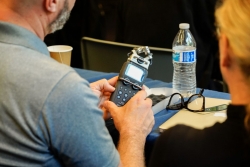Tag: training
Sign up for the Oral History Center’s Advanced Institute (August 5–9)
The UC Berkeley Oral History Center is pleased to announce that applications are open for the 2024 Advanced Institute!
The OHC is offering online versions of our educational programs again this year.
Advanced Institute: M–F, August 5–9, 8:30 a.m.–2 p.m., via Zoom
We are now accepting applications for our 2024 Advanced Institute on a rolling basis. Please apply early, as spots fill quickly.
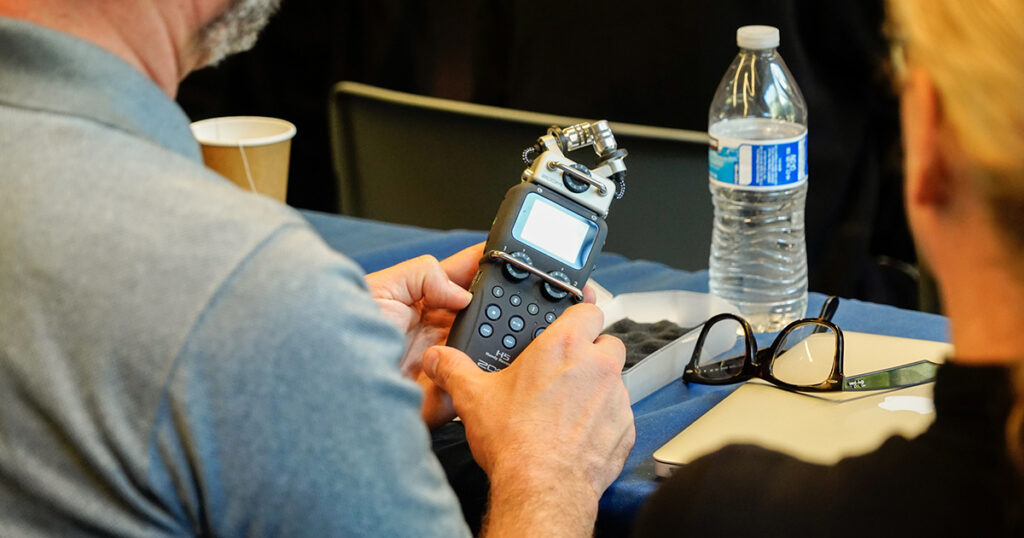
The Oral History Center is offering a virtual version of our one-week Advanced Institute on the methodology, theory, and practice of oral history. This will take place Aug. 5-9, 2024.
The institute is designed for graduate students, postdoctoral fellows, university faculty, independent scholars, and museum and community-based historians who are engaged in oral history work. The goal of the institute is to strengthen the ability of its participants to conduct research-focused interviews and to consider special characteristics of interviews as historical evidence in a rigorous academic environment.
We ask that applicants have a project in mind that they would like to workshop during the week. All participants are required to attend small daily breakout groups in which they will workshop projects.
In the sessions, we will devote particular attention to how oral history interviews can broaden and deepen historical interpretation situated within contemporary discussions of history, subjectivity, memory, and memoir.
Apply for the Advanced Institute.
Overview of the week
The institute is structured around the life cycle of an interview. Each day will focus on a component of the interview, including foundational aspects of oral history, project conceptualization, the interview itself, analytic and interpretive strategies, and research presentation and dissemination.
Instruction will take place online tentatively from 8:30 a.m. to 2 p.m. Pacific time, with breaks woven in. There will be three sessions a day: two seminar sessions and a workshop. Seminars will cover oral history theory, legal and ethical issues, project planning, oral history and the audience, anatomy of an interview, editing, fundraising, and analysis and presentation. During workshops, participants will work throughout the week in small groups, led by faculty, to develop and refine their projects.
Participants will be provided with a resource packet that includes a reader, contact information, and supplemental resources. These resources will be made available electronically prior to the institute, along with the schedule.
Applications and cost
The cost of the institute is $600. We are offering a limited number of participants a discounted tuition of $300 for students, independent scholars, or those experiencing financial hardship. If you would like to apply for discounted tuition, please indicate this on your application form and we will send you more information.
Please note that the OHC is a soft-money research office of the university, and as such receives precious little state funding. Therefore, it is necessary that this educational initiative be a self-funding program. Unfortunately, we are unable to provide financial assistance to participants other than our limited number of scholarships. We encourage you to check in with your home institutions about financial assistance; in the past we have found that many programs have budgets to help underwrite some of the costs associated with attendance. We will provide receipts and certificates of completion as required for reimbursement.
Applications are accepted on a rolling basis. We encourage you to apply early, as spots fill up quickly.
Questions
Please contact Shanna Farrell (sfarrell@library.berkeley.edu) with any questions.
About the Oral History Center
UC Berkeley’s Oral History Center, or the OHC, is one of the oldest oral history programs in the world. We produce carefully researched, recorded, and transcribed oral histories and interpretive materials for the widest possible use. Since 1953 we have been preserving voices of people from all walks of life, with varying perspectives, experiences, pursuits, and backgrounds. We are committed to open access and our oral histories and interpretive materials are available online at no cost to scholars and the public.
Sign up for our monthly newsletter featuring think pieces, new releases, podcasts, Q&As, and everything oral history. Access the most recent articles from our home page or go straight to our blog home.
Announcing Dates for 2021 OHC Educational Programs
The Oral History Center is pleased to announce that applications are now open for the 2021 Introductory Workshop and Advanced Institute!
The Introductory Workshop will held over two days on March 5-6, 2021.
The 2021 Introduction to Oral History Workshop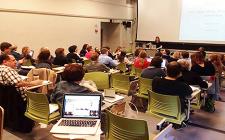 will be held virtually via Zoom over two days on Friday, March 5, from 12–3 p.m. and Saturday, March, 6 from 9 a.m.–1.p.m. Pacific Time. Applications for this workshop are open here and will be accepted through February 16, 2021. Space is limited so apply early to ensure a spot.
will be held virtually via Zoom over two days on Friday, March 5, from 12–3 p.m. and Saturday, March, 6 from 9 a.m.–1.p.m. Pacific Time. Applications for this workshop are open here and will be accepted through February 16, 2021. Space is limited so apply early to ensure a spot.
The two-day day introductory workshop tuition is $200 and is designed for people who are interested in an introduction to the basic practice of oral history. The workshop serves as a companion to our more in-depth Advanced Oral History Summer Institute held in August.
This workshop focuses on the “nuts-and-bolts” of oral history, including methodology and ethics, practice, and recording. It will be taught by our seasoned oral historians and include hands-on practice exercises. Everyone is welcome to attend the workshop. Prior attendees have included community-based historians, teachers, genealogists, public historians, and students in college or graduate school.
The Advanced Institute will be held from August 9-13, 2021.
The OHC is offering an online version of our one-week advanced institute on the methodology, theory, and practice of oral history. This will take place via Zoom from August 9-13, 2021. Applications will be accepted through July 16, 2021. Apply now!
The cost of the Advanced Institute has been adjusted to reflect the online nature of this year’s program. This year’s cost has been adjusted to $550. See below for details about this year’s institute.
The institute is designed for graduate students, postdoctoral fellows, university faculty, independent scholars, and museum and community-based historians who are engaged in oral history work. The goal of the institute is to strengthen the ability of its participants to conduct research-focused interviews and to consider special characteristics of interviews as historical evidence in a rigorous academic environment.
We will devote particular attention to how oral history interviews can broaden and deepen historical interpretation situated within contemporary discussions of history, subjectivity, memory, and memoir.
Overview of the Week
The institute is structured around the life cycle of an interview. Each day will focus on a component of the interview, including foundational aspects of oral history, project conceptualization, the interview itself, analytic and interpretive strategies, and research presentation and dissemination.
Instruction will take place online from 8:30 a.m. – 12:30 p.m. Pacific Time, with breaks woven in. There will be three sessions a day: two seminar sessions and a workshop. Seminars will cover oral history theory, legal and ethical issues, project planning, oral history and the audience, anatomy of an interview, editing, fundraising, and analysis and presentation. During workshops, participants will work throughout the week in small groups, led by faculty, to develop and refine their projects.
Participants will be provided with a resource packet that includes a reader, contact information, and supplemental resources. These resources will be made available electronically prior to the Institute, along with the schedule.
Applications and Cost
The cost of the institute is $550. OHC is a soft money research office of the university, and as such receives precious little state funding. Therefore, it is necessary that this educational initiative be a self-funding program. Unfortunately, we are unable to provide financial assistance to participants. We encourage you to check in with your home institutions about financial assistance; in the past we have found that many programs have budgets to help underwrite some of the costs associated with attendance. We will provide receipts and certificates of completion as required for reimbursement.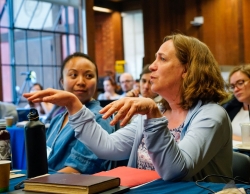
Read Amanda Tewes’s recap of the 2020 session here.
Read Q&A with Institute Alums Julia Thomas, Alex Vassar, Alec O’Halloran, Kelly Navies, Meagan Gough, Nicole Ranganath, and Marc Robinson.
Questions?
Please contact Shanna Farrell at sfarrell@library.berkeley.edu with any questions.
Oral History Center Leads Introductory Workshop
by Shanna Farrell; @shanna_farrell
When Spring rains shower the Bay Area, saturating the ground and greying the skies, we know it’s time for our annual Introductory Oral History Workshop. On Saturday, March 2nd, as raindrops beat against our stained-glass windows, we welcomed a group of forty to campus, where they they learned the nuts and bolts of doing oral history . They braved the wet weather to join us from all over Northern California , and even as far as North Carolina.
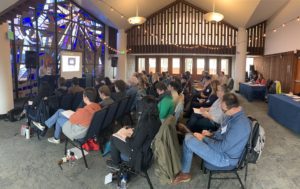
The oral history project topics of attendees varied from burlesque to the Third World Liberation Front, and from the mining industry to environmental conservation. However, we design our introductory seminars to be applicable for everyone. OHC Director Martin Meeker gave an overview of what makes oral history oral history. Paul Burnett and Roger Eardley-Pryor discussed the intricacies of project planning. Amanda Tewes and Shanna Farrell led a discussion on interviewing techniques. Burnett and Meeker shared recording tips and tricks, and Tewes and Todd Holmes shared potential uses of oral history drawing from a cadre of past projects.
The workshop also featured a live interview exercise led by Farrell. One of the workshop participants, Trisha Pritikin, volunteered to be interviewed by Farrell so other attendees could see an oral history unfold in real time. Eardley-Pryor then engaged Farrell, Pritikin, and workshop participants in a group discussion. Attendees shared their observations, asked Farrell about certain lines of questioning , and inquired how Pritikin felt sitting in the “hotseat.”
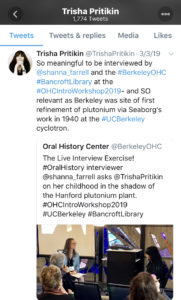
These workshops always prove inspiring for OHC interviewers, staff, and student supporters because we interact with attendees who share our passion for oral history.
Thanks to all of you who made the workshop so great! And if you missed it this year, we’ll see you next Spring in 2020!
Want more oral history training? Check out our Advanced Oral History Summer Institute. Email Shanna Farrell (sfarrell@library.berkeley.edu) with questions.
Program Evaluation Resources class
Richmond Instruction
Wednesday, February 14, 2018, 10-11am
Room C-140
850 Marina Bay Parkway, Richmond, CA
————————-
RSVP by Tuesday, February 13th to Michael Sholinbeck at
msholinb@library.berkeley.edu or (510) 642-2510.
Please obtain your supervisor’s approval before you RSVP.
————————-
Supervisors: Please encourage your staff to attend if appropriate.
* Do you need to do an evaluation of the programs you offer?
* Are you interested in learning about free online toolkits and other resources that will help you develop a program evaluation?
* Want to learn how to find an online class on program evaluation?
* Want to find resources with examples of other people’s program evaluations?
If you answered “yes” to any of these questions, then please come to the Sheldon Margen Public Health Library’s Program Evaluation class!
Topics covered will include:
1. Resource Toolkits for program evaluation
2. “Best Practices” in program evaluation
3. Finding program evaluation literature
4. Professional tools for program evaluation
Class Objective:
To introduce CDPH staff to quality program evaluation tools and resources that are freely available online. Use of these resources will assist with developing
effective program evaluations.
Please note: This class is NOT a how-to-do program evaluation class, but rather will show resources devoted to program evaluation to help with your work. Health promotion, health communication, and health education resources were covered in the Health Promotion/Health Education Resources class on January 10th and so will not be covered here.
These training sessions are free to CDPH staff. A certificate of completion will be available for those who attend the class.
A schedule of other upcoming training sessions is available online here for you.
Love Data Week 2018 at UC Berkeley
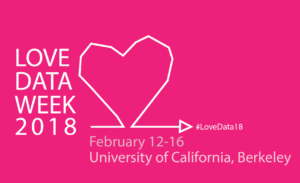 The University Library, Research IT, and Berkeley Institute for Data Science will host a series of events on February 12th-16th during the Love Data Week 2018. Love Data Week a nationwide campaign designed to raise awareness about data visualization, management, sharing, and preservation.
The University Library, Research IT, and Berkeley Institute for Data Science will host a series of events on February 12th-16th during the Love Data Week 2018. Love Data Week a nationwide campaign designed to raise awareness about data visualization, management, sharing, and preservation.
Please join us to learn about multiple data services that the campus provides and discover options for managing and publishing your data. Graduate students, researchers, librarians and data specialists are invited to attend these events to gain hands-on experience, learn about resources, and engage in discussion around researchers’ data needs at different stages in their research process.
To register for these events and find out more, please visit: http://guides.lib.berkeley.edu/ldw2018guide
Schedule:
Intro to Scopus APIs – Learn about working with APIs and how to use the Scopus APIs for text mining.
01:00 – 03:00 p.m., Tuesday, February 13, Doe Library, Room 190 (BIDS)
Refreshments will be provided.
Data stories and Visualization Panel – Learn how data is being used in creative and compelling ways to tell stories. Researchers across disciplines will talk about their successes and failures in dealing with data.
1:00 – 02:45 p.m., Wednesday, February 14, Doe Library, Room 190 (BIDS)
Refreshments will be provided.
Planning for & Publishing your Research Data – Learn why and how to manage and publish your research data as well as how to prepare a data management plan for your research project.
02:00 – 03:00 p.m., Thursday, February 15, Doe Library, Room 190 (BIDS)
Hope to see you there!
Richmond Instruction: Health Promotion/Health Education Resources class
Wednesday, January 10, 2018, 10-11am
Room C-136
850 Marina Bay Parkway, Richmond, CA
————————-
RSVP by Tuesday, January 9th to Michael Sholinbeck at
msholinb@library.berkeley.edu or (510) 642-2510.
Please obtain your supervisor’s approval before you RSVP.
————————-
Supervisors: Please encourage your staff to attend if appropriate.
* Does your work at CDPH involve health promotion, health communication, or health education?
* Are you interested in learning about toolkits and other resources that will help you develop a health intervention program?
* Interested in how to find literature on health education/promotion topics?
* Do you need to develop consumer health handouts?
* Want to know about quality sources for consumer health information, including non-English language handouts and materials?
If you answered “yes” to any of these questions, then please come to the Sheldon Margen Public Health Library’s Health Promotion and Health Education Resources class!
Topics covered will include:
1. Resource Toolkits for Developing Programs
2. “Best Practices” in Health Education/Promotion
3. Finding Health Education Literature
4. Patient/Consumer Health Education Materials
(This class will not cover program evaluation resources; there will be a separate Program Evaluation Resources class on Wed. Feb. 14, 2018.)
Class Objective:
To introduce CDPH staff to quality health promotion and health education tools and resources that are freely available online. Use of these resources will assist with efficiently developing effective, evidence-based health promotion programs.
These training sessions are free to CDPH staff. A certificate of completion will be available for those who attend the class.
A schedule of other upcoming training sessions is available online.
From the Oral History Center Director – OHC and Education
For an office that does not offer catalog-listed courses, the Oral History Center is still deeply invested in — and engaged with — the teaching mission of the university.
For over 15 years, our signature educational program has been our annual Advanced Oral History Summer Institute. Started by OHC interviewer emeritus Lisa Rubens in 2002 and now headed up by staff historian Shanna Farrell, this week-long seminar attracts about 40 scholars every year. Past attendees have come from most states in the union and internationally too — from Ireland and South Korea, Argentina and Japan, Australia and Finland. The Summer Institute, applications for which are now being accepted, follows the life cycle of the interview, with individual days devoted to topics such as “Project Planning” and “Analysis and Interpretation.”
In 2015 we launched the Introduction to Oral History Workshop, which was created with the novice oral historian in mind, or individuals who simply wanted to learn a bit more about the methodology but didn’t necessarily have a big project to undertake. Since then, a diverse group of undergraduate students, attorneys, authors, psychologists, genealogists, park rangers, and more have attended the annual workshop. This year’s workshop will be held on Saturday February 3rd and registration is now open.
In addition to these formal, regularly scheduled events, OHC historians and staff often speak to community organizations, local historical societies, student groups, and undergraduate and graduate research seminars. If you’d like to learn more about what we do at the Center and about oral history in general, please drop us a note!

In recent years we have had the opportunity to work closely with a small group of Berkeley undergrads: our student employees. Although the Center has employed students for many decades, only in the past few years have they come to play such an integral role in and make such important contributions to our core activities. Students assist with the production of transcripts, including entering narrator corrections and writing tables of contents; they work alongside David Dunham, our lead technologist, in creating metadata for interviews and editing oral history audio and video; and they partner with interviewers to conduct background research into our narrators and the topics we interview them about. With these contributions, students have helped the Center in very real, measurable ways, most importantly by enabling an increase in productivity: the past few years have been some of the most productive in terms of hours of interviews conducted in the Center’s history. We also like to think that by providing students with intellectually challenging, real-world assignments, we are contributing to their overall educational experience too.
As 2017 draws to a close, I join my Oral History Center colleagues Paul Burnett, David Dunham, Shanna Farrell, and Todd Holmes in thanking our amazing student employees: Aamna Haq, Carla Palassian, Hailie O’Bryan, Maggie Deng (who wrote her first contribution to our newsletter this issue), Nidah Khalid, Pilar Montenegro, Vincent Tran, and Marisa Uribe!
Martin Meeker, Charles B. Faulhaber Director of the Oral History Center
Ingenuity Pathway Analysis (IPA) workshop

A representative from Qiagen will offer a hands-on training workshop on using IPA to interpret expression data (including RNA-seq).
You are invited to participate in this free training, and are encouraged to bring your own laptop or use the computer workstations in our training room.
Please register if you are interested in attending.
The workshop will cover how to:
- Format, upload your data, and launch an analysis
- Identify likely pathways that are expressed
- Find causal regulators and their directional effect on gene functions and diseases
- Build pathways, make connections between entities, and overlay multiple datasets on a pathway or network
- Understand the affected biological processes
- Perform a comparison analysis: utilize a heat map to easily visualize trends across multiple time points or samples
Questions? Please contact Elliott Smith (esmith@library.berkeley.edu)
Great talks and fun at csv,conf,v3 and Carpentry Training
Day1 @CSVConference! This is the coolest conf I ever been to #csvconf pic.twitter.com/ao3poXMn81
— Yasmina Anwar (@yasmina_anwar) May 2, 2017
On May 2 – 5 2017, I (Yasmin AlNoamany) was thrilled to attend the csv,conf,v3 2017 conference and the Software/Data Carpentry instructor training in Portland, Oregon, USA. It was a unique experience to attend and speak with many people who are passionate about data and open science.
The csv,conf,v3
The csv,conf is for data makers from academia, industry, journalism, government, and open source. We had amazing four keynotes by Mike Rostock, the creator of the D3.js (JavaScript library for visualization data), Angela Bassa, the Director of Data Science at iRobot, Heather Joseph, the Executive Director of SPARC, and Laurie Allen, the lead Digital Scholarship Group at the University of Pennsylvania Libraries. The conference had four parallel sessions and a series of workshops about data. Check out the full schedule from here.
.@ErinSBecker is talking @CSVConference about @datacarpentry & @swcarpentry workshops! #csvconf pic.twitter.com/beKOixMNrt
— Yasmina Anwar (@yasmina_anwar) May 2, 2017
If you wanna change the culture, start early! @ProjectJupyter @openscience @CSVConference #csvconf pic.twitter.com/7OVMjMvVrc
— Yasmina Anwar (@yasmina_anwar) May 2, 2017
"Speak out, step up, take actions" Great ending for an amazing keynote by @hjoseph @CSVConference #csvconf pic.twitter.com/O4Vogsfhe4
— Yasmina Anwar (@yasmina_anwar) May 2, 2017
Fascinated by @yasmina_anwar's research on using web archives to automatically create histories for the next generation. #csvconf pic.twitter.com/sbI359n5Bk
— V Ikeshoji-Orlati (@vikeshojiorlati) May 3, 2017
I presented on the second day about generating stories from archived data, which entitled “Using Web Archives to Enrich the Live Web Experience Through Storytelling”. Check out the slides of my talk below.
I demonstrated the steps of the proposed framework, the Dark and Stormy Archives (DSA), in which, we identify, evaluate, and select candidate Web pages from archived collections that summarize the holdings of these collections, arrange them in chronological order, and then visualize these pages using tools that users already are familiar with, such as Storify. For more information about this work, check out this post.
https://twitter.com/HamdanAzhar/status/859851223515582464
The csv,conf deserved to won the conference of the year prize for bringing the CommaLlama. The Alpaca brought much joy and happiness to all conference attendees. It was fascinating to be in csv,conf 2017 to meet and hear from passionate people from everywhere about data.
#commaLlama is in the chapel 😃! This is amazing! #csvconf @CSVConference pic.twitter.com/cnQJzQ9L3h
— Yasmina Anwar (@yasmina_anwar) May 3, 2017
#commaLlama with @CLIRnews fellows @vikeshojiorlati and @yasmina_anwar @CSVConference #csvconf pic.twitter.com/Mpfooy9ccP
— Yasmina Anwar (@yasmina_anwar) May 3, 2017
#Trump 😒 😡vs #Clinton😭💕 #emoji #emojis #electionsemojis #csvconf pic.twitter.com/yYoUzm158H
— Yasmina Anwar (@yasmina_anwar) May 3, 2017
#Data needs to be findable, accessible, interoperable, reusable! @rchampieux #csvconf pic.twitter.com/1VIQzHSIh4
— Yasmina Anwar (@yasmina_anwar) May 3, 2017
Shout out for all @CSVConference organizers! We enjoyed all the talks, keynotes, #commaLlama #csvconf #data pic.twitter.com/BLjRCCRYdu
— Yasmina Anwar (@yasmina_anwar) May 4, 2017
After the conference, Max Odgen from the Dat Data Project gave us a great tour from the conference venue to South Portland. We had a great food from street food trucks at Portland, then we had a great time with adorable neighborhood cats!
https://twitter.com/yasmina_anwar/status/860017390968492032
Tha Carpentry Training
Congratulations, everyone! You did it! Portland 2017 cohort of @datacarpentry / @swcarpentry Instructors! @LibCarpentry #porttt pic.twitter.com/J3ceEzwOBQ
— Library Carpentry (@LibCarpentry) May 5, 2017
https://twitter.com/LibCarpentry/status/860571982479241216
The two days had a mix of lectures and hands-on exercises about learning philosophy and Carpentry teaching practices. It was a unique and fascinating experience to have. We had two energetic instructors, Tim Dennis and Belinda Weaver, who generated welcoming and collaborate environment for us. Check out the full schedule and lessons from here.
.@yasmina_anwar just convinced me to fall in love with RStudio from her live code teaching example at #porttt.
— Elaine Wong (@elthenerd) May 5, 2017
At the end, I would like to acknowledge the support I had from the California Digital Library and the committee of the csv,conf for giving me this amazing opportunity to attend and speak at the csv,conf and the Carpentry instructor training. I am looking forward to applying what I learned in upcoming Carpentry workshops at UC Berkeley.
–Yasmin
Professional Development: Best Practices for Project Management Success
Want to learn more about project management principles and theories? Want to see examples of best practices? Then this free edX class might be of interest to you!
The course will cover:
* project management methods and best practices
* project portfolio management
* the project management office
* Six Sigma
* corporate culture and organizational behavior
* project management leadership
This course is part of the Rochester Institute of Technology MicroMasters Program that is designed to teach the importance of the organizational and leadership characteristics for the success of projects.
Begins: May 31, 2017
Length: 11 weeks
Cost: Free with the option to add a Verified Certificate for $150
More information is available on the edX website.
